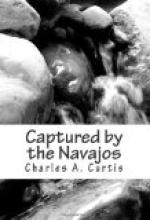“What does it mean? What does it mean?” exclaimed Frank. “Why are those Navajo boys running their horses in this direction? It can’t be—”
“Never mind, Frank,” I interrupted. “Let us get down to the men as soon as we can. The Indian women are already riding after the war-party.”
At considerable risk to life and limb we slid down the ragged angle which we had ascended, and hurried to where Baldwin and the soldiers stood beside their saddled steeds.
We had barely reached the crest from which we could see the valley when the three whitewashed boys appeared on their panting and foaming animals, the little one on the buck-skin pony in the lead.
“What in the world is this?” exclaimed Baldwin. “Three whitewashed young redskins! What do they want of us?”
“Here we are!” shouted a familiar voice, in excellent English. “Here we are—Manuel, Sapoya, and I!”
Before we could sufficiently recover from our surprise, or, rather, calm our joyful realization of a hope born of the boys’ start from the valley below, they were among us, and Henry had sprung from his horse and embraced his brother, leaving a generous coating of yeso upon the army blue. Tears of joy had ploughed two streaks through the whiting on his face, and lent a comical effect to the boyish countenance. A general handshake ensued, and Corporal Frank asked, “Where are your clothes, Henry?”
“Confiscated by the chief Elarnagan.”
“Not to wear?”
“Well, no; I think they might prove baggy on his diminutive person.”
“Then why did he take them?”
“He has a numerous progeny, and the young Elarnaganitos have an article apiece. My saddle and bridle went to Mrs. Elarnagan. She rides astride, you know.”
“When did the chief take your clothes?”
“Just as soon as I arrived in the valley my horse and I were stripped of—But hold on, Frank; what am I thinking of?” and Henry ran to one of the other boys, a graceful youngster whose perfect limbs and handsome face the yeso could not mask, and who sat his horse as if he were a part of the animal. Saying something to him in an undertone, the boy dismounted and approached me with Henry, who said, in Spanish: “This is Manuel Augustine Perea y Luna, of Algodones. It is he who planned the escape when I told him there were soldiers near.”
I took the Mexican boy’s hand and assured him of the great happiness his escape afforded me, and the greater happiness it would afford his mother and relatives.
Frank approached, took Manuel’s hand, and then dropped it to give him a hearty and brotherly embrace.
“Ah, Manuelito mio, I dreamed many dreams of rescuing you as we marched through this country, but I never believed they would be realized,” he said.
“But the little Enrique acted, and I am here,” laughed Manuel.
“And Frank acted, too,” said I, “as you shall soon hear; and you will learn that it took both boys to effect your rescue.”




